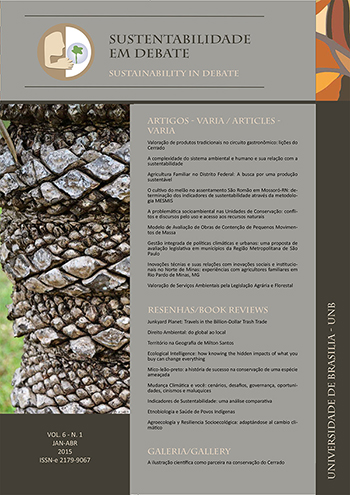Traditional product rating in gastronomic circuits:
lessons from the Cerrado
DOI:
https://doi.org/10.18472/SustDeb.v6n1.2015.10709Keywords:
Produtos tradicionais, Alta gastronomia, Processo de valoração, Dispositivos de julgamentoAbstract
The social construction of differentiated and nested markets and alternative agrifood systems in relation to conventional agribusiness systems of modern agriculture constitute a significant strategy to overcome the exclusion of millions of small farmers and peasants. On its turn, the growing demand and differentiated use of traditional products in the gastronomic circuit, as well as new forms of interaction between chefs and farmers who produce traditional products, can be a drive for the construction of these differentiated markets. One of the findings of this
article is that the asymmetry between chefs and producers in the possession of symbolic capital necessary for the assessment process of the typical products has a negative impact for the distribution of economic capital and, as a result, there is great unevenness between the prices paid to produces and the prices of the dishes incorporating such products as delicacies. The appropriation of the economic result of the valuation decreases as a result of this process. The producer knowledge is often appropriated and reproduced in the assessment process and he does not take advantage of it. Departing from contributions of economic sociology and the economy of singularities, such issues are discussed by this article.
Downloads
References
BECKERT,J. Beyond the Market. The Social Foundations of Economic Efficiency, New Jersey: Princeton
University Press, 2002.
BECKERT, J. The social order of markets. In MPIfG Working Paper 07/15, 2007.
BECKERT, J. The Transcending Power of Goods: Imaginative Value in the Economy.
In MPIfG Discussion Paper 10/4, 2010.
BECKERT, J.; ASPERS, P. The Worth of Goods: Valuation and Pricing in the Economy, New York:
Oxford University Press, 2011.
BECKERT, J.; RÖSSEL, J.; SCHENK, P. Wine as a cultural product: Symbolic capital and price formation
in the wine field. In MPIfG Discussion Paper, Nº. 14/2, 2014.
BOURDIEU, P. A distinção: crítica social do julgamento, São Paulo: Edusp, 2007.
ESSER, H. Soziologie. Spezielle Grundlagen, Band 1: Situationslogik und Handeln, Frankfurt:
Campus, 1999.
FUCHS, D. et al. Actors in private food governance: the legitimacy of retail standards and multistakeholder
initiatives with civil society participation. In Agricultural Human Values, Vol. 28, p.
353 ”“ 367.
GIDDENS, A. Modernização reflexiva: política, tradição e estética na ordem social moderna. São
Paulo: Unesp, 1997.
GRENFELL, M. Pierre Bourdieu: key concepts. Durham: Acumen, 2008.
HAY, C. The political economy of price and status formation in the Bordeaux en primeur market:
the role of wine critics as rating agencies. In Socio-Economic Review, v. 8, n. 4, p. 685 ”“ 707,
2010.
IANNI, O. A era do globalismo, 3.ed., Rio de Janeiro: Civilização Brasileira, 1997.
INGLEHART. R; WELZEL, C. Modernization, Cultural Change and Democracy, New York: Cambridge
University Press, 2005.
JEVONS, W. A Teoria da Economia Política, Série Os Economistas, Editora Nova Cultural, São
Paulo, 1996.
KARPIK, L. Valuing the Unique: The Economics of Singularities, New Jersey: Princeton University
Press, 2010.
KING, B. G. ; PEARCE, N. A. The Contentiousness of Markets: Politics, Social Movements, and
Institutional Change in Markets. In Annual Review of Sociology, Vol. 36, p. 249 ”“ 267, 2010.
LAMONT, M. Toward a comparative sociology of valuation and evaluation. In Annual Review of
Sociology, 38, nº. 1: 201 ”“ 221, 2012.
MARX, K. O Capital: volume I, Série Os Economistas, São Paulo: Editora Nova Cultural, 1996.
MÖLLERING, G. Market constitution analysis: a new framework applied to Solar Power Technology
Markets. In MPIfG Working Paper 09/07, 2009.
PLOEG, J. D. van der. Camponeses e impérios alimentares: lutas por autonomia e sustentabilidade
na era da globalização, Trad. Rita Pereira, Porto Alegre: Editora da UFRGS, 2008.
POUTIGNAT, P.; STREIFF-FENART, J. Teorias da etnicidade, São Paulo: Fundação Editora Unesp.
2000.
TALLONTIRE, A. et al. Beyond the vertical? Using value chains and governance as aframework to
analyse private standards initiatives in agri-food chains. In Agricultural Human Values, Vol. 28,
p. 427 ”“ 441.
WILKINSON, J. Mercados, redes e valores, Porto Alegre: Editora da UFRGS, 2008.
Downloads
Published
How to Cite
Issue
Section
License
SUSTAINABILITY IN DEBATE – Copyright Statement
The submission of original scientific work(s) by the authors, as the copyright holders of the text(s) sent to the journal, under the terms of Law 9.610/98, implies in the concession of copyrights of printed and/or digital publication to the Sustainability in Debate Journal of the article(s) approved for publication purposes, in a single issue of the journal. Furthermore, approved scientific work(s) will be released without any charge, or any kind of copyright reimbursement, through the journal’s website, for reading, printing and/or downloading of the text file, from the date of acceptance for publication purposes. Therefore, the authors, when submitting the article (s) to the journal, and gratuitous assignment of copyrights related to the submitted scientific work, are fully aware that they will not be remunerated for the publication of the article(s) in the journal.
The Sustainability in Debate Journal is licensed under Creative Commons License – Non-Commercial-No-Derivation Attribution (Derivative Work Ban) 3.0 Brazil, aiming at dissemination of scientific knowledge, as indicated on the journal's website, which allows the text to be shared, and be recognized in regards to its authorship and original publication in this journal.
Authors are allowed to sign additional contracts separately, for non-exclusive distribution of the works published in the Sustainability in Debate Journal (for example, in a book chapter), provided that it is expressed the texts were originally published in this journal. Authors are allowed and encouraged to publish and distribute their text online, following publication in Sustainability in Debate (e.g. in institutional repositories or their personal pages). The authors expressly agree to the terms of this Copyright Statement, which will be applied following the submission and publishing by this journal.






